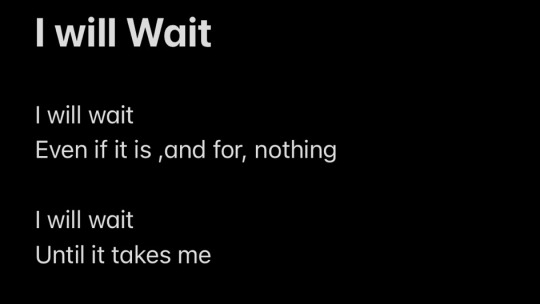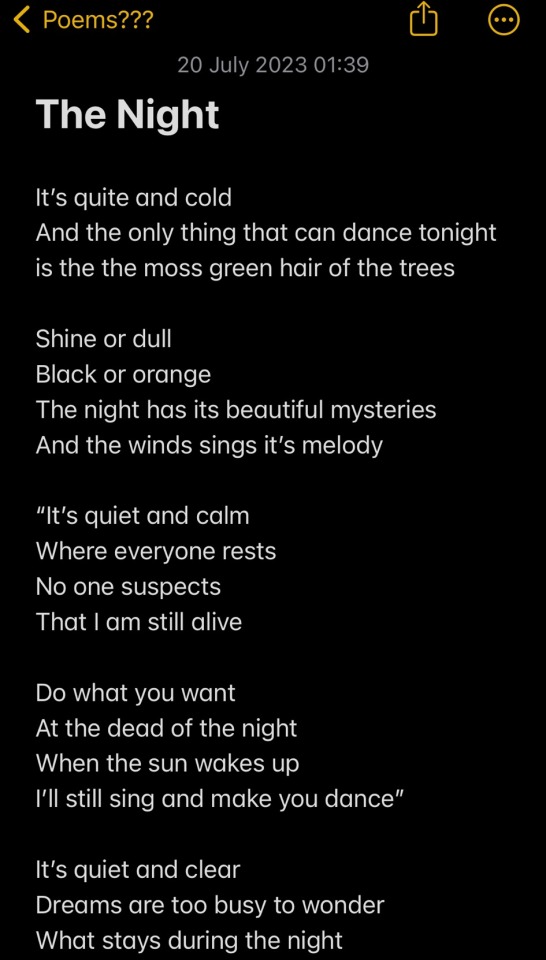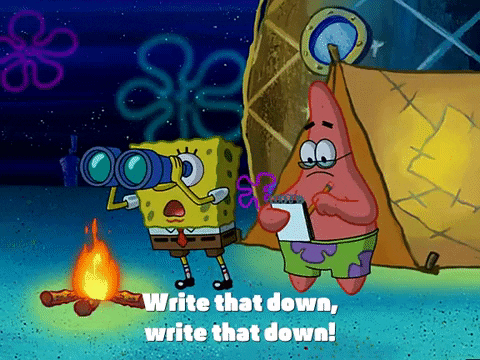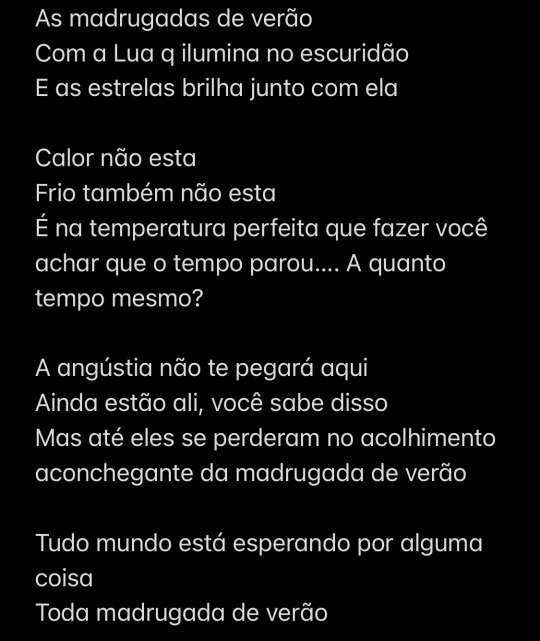Poems written in English and Portuguese (bc I’m cool like that) abt my silly problems or my interests ✨
Last active 3 hours ago
Don't wanna be here? Send us removal request.
Text
Omg tumblr hiii

Whachu think??? 👉🏼👈🏼
#poems#vent#vent poetry#english poem#my poem#silly poem abt silly feelings go brrr#tumblr hashtags are so#silly wtf KAKAKAKA#irra#yippie
0 notes
Text

What do you guys think?? 👉🏼👈🏼
#poems#poemas#night time#idk how to tag#aaaaa#sweg#mlem#nth rhymes here#idk#how to#do that#properly#:]#silly words#goofy poem#so goofy#so silly#my poem#my poetry#night poetry#night poem#slay#another day another slay
5 notes
·
View notes
Note
I love your storytelling! I was wondering if you’d give tips for outlining and planning a story, I adore your pacing and different arcs. I’m new to writing and I’m having trouble keeping things cohesive even with an outline and I just wanted to know if you had any perspective or tips to share. Don’t feel pressured to answer. I love your replica au and hope you are doing well!
Aw thank you so much! Sure I can talk about that. Mind you aside from a screen writing course I took in college I am entirely self taught. This is just information I’ve absorbed and worked out over the past couple decades of personal writing. More below the cut.

WRITING/OUTLINING STYLE
For starters you need to figure out what style of outlining works for you. I’ve been told there are two types of writers. The Architect and the Gardener. The Architect is someone who has the entire framework plotted out and builds off of that. The Gardener starts with a basic setup and lets the story flow naturally and chronologically from there, basing it entirely off of their extensive knowledge of the world, characters, and how they interact within it.
There are draw backs to both sides. Gardeners can often times write themselves into a corner or lose track of where the story should go (leading to lots of unnecessary fluff and loose ends). While architects have a habit of ignoring a lot of the important “middle stuff” that leads to their major predetermined plot points and sometimes don’t realize how the story is naturally leaning in other directions, making it jarring when they try to force it back on track.
I like using both methods but in different situations. For example before I even put pen to paper I already knew what I wanted the beginning and ending of Replica to be as well as a few pivotal scenes. I had a basic framework. However that framework has grown and changed over time as I’ve nurtured it. So I’ve come up with my own term I like to call “the Greenhouse Method,” where you may create the basic framework but understand that things within it can change and warp the structure to something entirely new. Just make sure it doesn’t go too off course.
That method may not work for everyone so I recommend looking inward to see what variation of the methods work best for you. Because if you’re not enjoying the process then there’s no point.
With this method I tend to list out major scenes of importance and then slowly figure out how they flow or cut into each other. Doing this involves several other factors I will state below…
THEMING
One important thing is to know what is the theme or message of your story. This doesn’t have to be obvious but every good story normally has an underlying theme. There needs to be a point. For example, Sherk is about accepting yourself for who you are. Jurassic Park is a warning about playing God.
Replica at its core is about cherishing your self worth and holding onto hope and loved ones even in the darkest times. Even when they’re not there anymore.
Whatever it may be, find that theme that means something to you, and make sure that feeling stays with you and the plot, even if subtly.
CHARACTERIZATION
Have a strong knowledge of the characters in your story. I achieve this by doing little exercises on how they would react to certain incidents or answering questionnaires. By doing this it allows them talk to each other within any scene I have setup but leave void of my own input. Instead I simply take notes rather than force them to say something they’re supposed to say (very Gardener style). Often times letting the characters be themselves allows them to say and do things I find far more entertaining than what I initially had planned.
It’s important with characters though that you make sure you let them be themselves rather than have them act out for pure drama/plot sake. I see that a lot in fan communities where characters will begin to cry or overreact in ways that seem out of character and it can really break my immersion. So know your characters. Know everything about them from what their favorite cookie is to how they deal with trauma. It’s all important to lead to the most natural of interactions.
SCENES
When plotting out scenes make sure that every one of them has a point. Every single scene. If there is nothing new to be learned, or changed, or shared, then there is no point beyond a few brief sentences to transition it to the next important scene. Avoid fluff that is just fluff for the sake of fluff. You can have fluffy scenes, sure, but make sure there is something else to be gained from it. I’ve read scenes that are literally just the same character harping over the same issue they’ve been dealing with without coming to any new conclusion or going through any sort of change, be it internal or external from the plot. I don’t like having my time wasted as a reader and neither should you as a writer!
THE ZONE
I don’t see many people talk about this but I think it’s important for any writer to find a space where they can zone out and let the story bloom in their mind. No judgement, no analyzing, just pure fun. For some this happens in the shower, or sitting in front of the laptop with a cup of tea, or me driving too fast down the freeway blasting music in my ears. I come up with all my best stuff while driving. Sometimes I will extend a drive just to finish a scene properly. Whatever it is, find what helps you get in that zone and see if you can play something out in your head. It helps keep me inspired for sure. If you've managed to come up with something you like, make sure to write it down and then come back to it later to look at it from a more analytical perspective. Does it work with my theme? Are the characters reacting realistically? Where does this happen in the timeline and how can it impact future store plot points? Etc.
EXTRA: EASY MISTAKE TO AVOID
This isn't so much about outlining, just writing in general, but when you start writing, be sure to choose a tense and stick with it. Many writers, myself included, prefer past tense. Though I’ve seen some people do present that can work well. Just make sure whatever you do stays consistent.
Example BAD: “Jane WENT to the store, hoping to find some crackers. She SPEAKS with the clerk to ask if he had any.”
Example GOOD: “Jane WENT to the store, hoping to find some crackers. She SPOKE with the clerk to ask if he had any.”
SUMMARY
Know your theme/message
Know your characters
Know your genre
Every scene should have a point and be interesting in some way
Recommend for beginners having an idea of where you want the story to conclude and see how that links up with your theme
Hope that helps. Sorry if I went off on a tangent but I feel like a lot of the story telling process is interconnected when done correctly. Let me know if you have any more specific issues you want addressed!
358 notes
·
View notes
Text
SickFic Prompts
I’ve been craving SickFic, so have some prompts and feel free to tag me here at @wordmage because I would love to see your takes on the prompts below. Feel free to add more, or use it for RP/art, whatever. I plan to try and fill them all out, myself.
99.9% Immunity - (character) never gets sick, right? Wrong.
Elephant in the Room - (character) is sick, but for some reason - rank, personality, etc - no one is talking about it
Heroes Don’t Take Sick Days - there’s no time to rest when you have to save the world, so (character) has to push themselves even when miserable
Insult to Injury - as if being injured wasn’t enough, (character) is getting sick too
Ill Timed - it’s the worst possible time for (character) to be sick, but their body didn’t get the memo
Irreplaceable - (character) is the leader/boss and isn’t able to take personal time off, even when they’re under the weather
It’s Nothing - (character) insists they’re fine, right up until they collapse
Medic Down - every group seems to have a primary caretaker. How do they handle it when (character) is the one sick?
Milking It - if (character) has to be sick, they’re at least going to get as much pampering out of others as they can
Not a Word - (character) said they don’t get sick, and isn’t in the mood for anyone to remind them while they recover
No Rest for the Wicked - the big bad (character) has more to worry about than the good guys
Open Secret - everyone knows (character) is sick, but they’re trying so hard no one has said anything
Persuasive Partners - (character) is sick, and refusing to stay put; their partner(s) give them a good reason to stay in bed
Stepping Up - boss/leader (character) is clearly miserable, so the others go out of their way to take as much of their workload as possible
Suffer in Silence - for whatever reason, (character) doesn’t want anyone to know they’re sick, and does everything they can to hide it
Take One Down… - (character) gets sick, and spreads it to the rest of the group
Team Mom/Dad - (character) is the one to always take care of others on the team
The Wolf Cries True - (character) has been known to exaggerate or even pretend they’re sick, only this time they’re telling the truth
This is Your Fault - (character A) was clingy while they were sick, and now (character B) has it
Why Didn’t You Say? - (character) hasn’t been feeling well, making for some uncharacteristic behavior, and their partner(s)/team/friends are much more understanding once they realize why
9K notes
·
View notes
Text
Madrugadas de verão

#my poem#short poem#minha poesia#poema original#poema português#poema sobre o verão pq graças a Deus ela tá de volta#madrugada#verão
0 notes